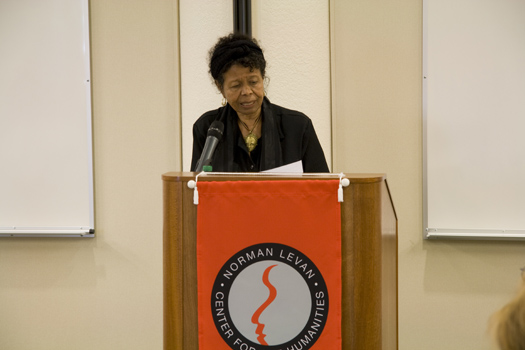Straightforward, yet metaphorical, terms and phrases to express herself through her poetry.
“I was later listening to an older piece I had done that I didn’t really like as much at the time it was done, and I said, ‘Damn! That’s a masterpiece,’” Cortez told an audience at Bakersfield College.
Cortez is an acclaimed poet, versatile writer, speaker and performer of her own poetry, who grew up in the Los Angeles area. She spoke at BC three different times Sept. 29 and mentioned that it was her first time visiting the area.
She read some of her poems, such as “Global Inequalities,” and “Conversations with Langston,” and even transformed things like food and gave them life with her words.
“Okra, it has sex with itself,” Cortez read.
There were poems titled “Carrot” and “Cheese,” with all taking a humanistic tone.
There were aspiring writers and musicians there as well as students coming for a class.
Nat Dove, a blues musician, historian, educator and a longtime friend of Cortez, played a major part in bringing Cortez to Bakersfield.
“I had heard about her coming to a nearby California area and decided to put this reading together and invited her to come speak,” Dove said.
The event was presented by the Norman Levan Center for the Humanities.
Someone in the audience asked Cortez what inspired her for the poem about New York, so Cortez talked about how she was in New York at the time of 9/11 and recalled her experience.
“I was in the gym on 23rd Street and 7th avenue, and I left to go home and I had to walk because all the taxis and subways were down. I remember all the people running toward me and I was the only one going in the opposite direction. I had to get home in lower Manhattan, which is the very street that all the ambulances and fire trucks had to go down to get the people out. You could here the sound of sirens for weeks after that,” Cortez explained.
This poem was titled “I am New York Too,” a sequel to her first poem written about New York in 1970 named “I am New York,” which she performed too.
Toward the end of her performance, Cortez played a musical piece she had written. It consisted of her poetic words and a group she had organized called The Spirefitters. It was named “Point of Departure,” an ode to Nicolas Guillen, the Hispanic poet and social protester for the Afro-Cuban Movement of the 1920s and ’30s.
Cortez was a figure herself in the civil rights movement during the 1960s. She was in Mississippi in 1963, and when she had finished, went back to Los Angeles, and talked about what had been going on in the South during the movement.
People from all walks of life were there and most were pleasantly surprised with what they saw and heard.
Roberto Ibarra, 22, biology major, thought it was an interesting event.
“It’s my first time hearing about her, and I am completely taken by it. I thought it would just be some boring speech and music, but it turned out to be a very interesting event,” Ibarra said. “I really like the one about the women and trees, and how it shows how women are like trees in the sense that without them, we wouldn’t exist.”
Ibarra described the musical piece as “very fluent and almost like a fencing match, where you can picture you and your opponent’s next moves clearly in your head.”
Cortez talked about how poetry in church and Langston Hughes were her first inspirations, but she had always provided her own encouragement. She advised the audience, “you have to be determined for yourself and have confidence in yourself.”
Cortez takes her work very seriously and would love to come back to Bakersfield during Black History month and collaborate with different groups in honor of the celebration.
She leaves the crowd with one last saying to remember, “Find your own voice. Use it. Use your own voice and find it.”


